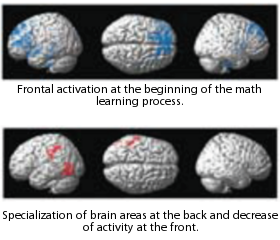
According to sources listed on both Understood.org and AboutDyscalculia.org, there is no universal consensus on the causes of dyscalculia. However, there have been studies on what happens in the brains of dyscalculics while solving math problems. To understand this let’s first have a look at how children develop mathematic abilities in general.
By the time they are just three months old, babies are able to differentiate between large and small quantities. When they get to preschool, children learn number words to enable them to describe these quantities. In elementary school, they learn Arabic numerals, which will not make any sense without those number words from the previous stage. Finally, children develop a mental conception of numbers – an internal number line – which automates such judgments as large vs. small, and estimations.

During this development, new skills are first processed in the anterior regions of the brain. These regions are responsible for logical thinking and for controlling attention and working memory. But as the brain masters these skills, they are taken on by the posterior regions. This automates basic number tasks and frees up capacity in the anterior regions for processing more complex and difficult ones.
For children with dyscalculia, this process of skills becoming automatic happens much more slowly than for their peers. Instead, these skills stay in the anterior regions of the brain, meaning that dyscalculic children have to concentrate fiercely to solve simple math problems. They rely on “counting out” the answer, a very slow process. As they advance through school the quantity and complexity of math problems they are expected to solve increases and along with it their anxiety. The more anxious a child becomes, the more overloaded will be his or her anterior brain regions, making it even more difficult to tackle numbers and solve problems. This can result in a life-long fear of math and can impact a dyscalculic student´s entire school and working career.
Dyscalculia is not nearly as well-known as dyslexia (chronic difficulty in reading) or dysgraphia (difficulty in writing). As a child with dyscalculia may be otherwise bright and creative, teachers and parents may not understand where the problems in math are coming from. This can lead to additional pressure on the child, who is already struggling with numbers and the feelings of inferiority these struggles cause.
I’m pretty relaxed about having dyscalculia now. After being assessed, I now know that there is a massive diff in my ability to process verbal and numerical information.
Before I knew about this, I was really struggling to try and understand concepts that were basically ripping up my knitting on a daily basis.
I’m reading a book just now by Alex Bellos ‘Adventures in numberland’ to see if I can get a better grasp on numbers, but not going to beat myself up about it if I can’t.
Thats great Peter! Being able to relax and take numbers on at your own pace is a great step to make, I wish you the best of luck.
Dyslexia can also be the causes of dyscalculia because ,without knowing how to read how can a person have an ability to understand and read mathematic problems.
Hi Matelita,
Thank you for your comment 🙂
Dyslexia and dyscalculia have a co-morbidity of up to 40%. While it is possible for them to occur together, they’re very different learning issues. And the connection between them isn’t yet clear.